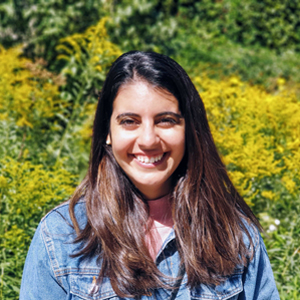Making MDM2 drug resistance a thing of the past
Fast facts
- Official title: Strategies to optimise use of MDM2 inhibitors in glioblastoma multiforme
- Lead researcher: Dr Veronica Rendo
- Where: Dana-Farber Cancer Institute, Boston, USA
- When: September 2020 – August 2023
- Cost: £180,000 over three years
- Research type: Adult, High grade, Academic, Glioblastoma
- Award type: Future leaders
p53 is the most frequently mutated gene in cancers and has been dubbed the guardian of the genome. It acts to prevent cells dividing when they have internal damage, to allow time for DNA repair or, if this isn’t possible, to force a cell into a programmed cell death. When p53 isn’t mutated, there are often alterations in the pathway it controls that prevent cancer cells from undergoing this programmed death.
MDM2 is the primary controller of p53. Only recently have drug companies been able to develop compounds that can effectively block the MDM2 control of p53. There are now a number in clinical trials, including in brain tumours.
What is it?
One of the major causes of glioblastomas (GBMs) is loss of activity of the p53 pathway, which controls damage to DNA and directs abnormal cells to die. Over 80% of GBMs have lost this pathway, and these tumours tend to be highly aggressive. One approach to reversing the damage is to use drugs called MDM2 inhibitors, which can reactivate the pathway in most cases. Researchers have found that GBMs grown in the laboratory can be highly sensitive to MDM2 inhibitors, but GBMs often relapse quickly.
Dr Rendo and her team, at the Dana-Farber Cancer Institute, aim to:
- 1)Understand how GBMs learn to grow despite treatment with MDM2 inhibitors. To do this the team will use GBM cells grown in the lab to test each gene in the tumour, and assess whether it’s involved in creating resistance to MDM2 inhibitors. They’ll also be looking for rare tumour cells that aren’t resistant to MDM2 therapy – to see what makes them vulnerable to the drugs. This part of the project will help the researchers to understand how resistance happens, and possibly indicate diagnostic tests to determine who is more likely to benefit from MDM2 inhibitors.
- 2) Identify ways to prevent resistance by combining MDM2 inhibitors with other treatments. The team have early data suggesting that drugs controlling cell division may be beneficial when combined with MDM2 inhibitors. They will be exploring this further in detailed experiments, as well as looking for other likely combinations of drugs including the current standard treatments used in the clinic.
The conclusions from this work will have a direct impact on patients, as it will guide the design of clinical trials that will not only test novel agents for the treatment of glioblastoma but will also optimize the way in which these regimens are administered, to guarantee the greatest efficacy and best long-term effect possible.
Dr Veronica Rendo
Why is it important?
In principle, most people with GBMs should respond well to MDM2 inhibitors. However, their GBMs learn to resist treatment. By understanding how GBMs learn to progress through treatment, Dr Rendo hopes to identify new ways to improve the use of these inhibitors for long-term remissions.
This research offers value for money for two reasons. First, the p53 pathway is perhaps the most dysregulated pathway in cancer, so any advances will have widespread benefit. Second, MDM2 inhibitors have already been developed and are being tested in clinical trials. This research includes experiments to make the best use of drugs that are already available.
Who will it help?
This research has the potential to help people who are diagnosed with a glioblastoma in the future. It could offer new insights to help doctors set a treatment that is more effective than those used today, by delaying a recurrence of the tumour, and improving prognoses.
Milestones
2020-2022
- Dr Rendo has characterised MDM2 inhibition in high-grade glioma cells and found that MDM2 inhibitor drugs exhibit profound effects in GBM cells grown from people’s tumours.
- She’s also shown that among p53 wild-type tumors, there is a range of drug response.
- By developing cell line models of MDM2 inhibitor-resistance, Dr Rendo discovered that other genetic and transcriptional alterations, besides p53 inactivation, can confer tolerance to these class of drugs. She and her team are currently working on confirming those alternative mechanisms and developing lab tests to identify other potential mediators of resistance.
2023
- The project achieved its goal by confirming that cell changes happen in response to blocking MDM2 in human tumour samples.
- The team improved the use of two treatments: MDM2 inhibitors along with TMZ to destroy tumour cells.
- They’re studying how effective navtemadlin (KRT-232) is for treating recurrent glioblastoma.
- Results also indicate that apart from the p53 gene, other genes can determine how well a tumour responds to treatment from the start.
Research is just one other way your regular gift can make a difference
Research is the only way we will discover kinder, more effective treatments and, ultimately, stamp out brain tumours – for good! However, brain tumours are complex and research in to them takes a great deal of time and money.
Across the UK, over 100,000 families are facing the overwhelming diagnosis of a brain tumour and it is only through the generosity of people like you can we continue to help them.
But, by setting up a regular gift – as little as £2 per month – you can ensure that families no longer face this destructive disease.
In this section

Dr Veronica Rendo
Dr Veronica Rendo is a Postdoctoral Research Fellow at the Dana-Farber Cancer Institute (Boston, USA). She is also an affiliated member of the Harvard Medical School and the Broad Institute of MIT and Harvard. Veronica is mentored by Dr Rameen Beroukhim.